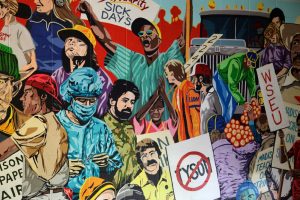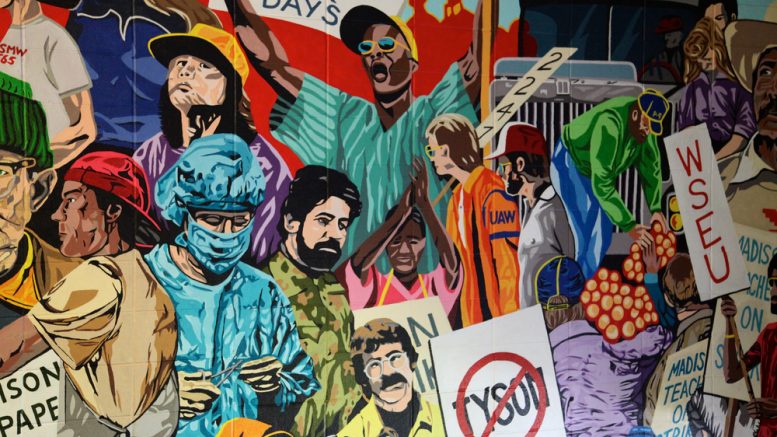
By Tom Crofton
The Commoner Call (6/8/17)
While wages are clearly a top reason to organize a union, and benefits are life-changing, struggles over working conditions may be the most important fights working people can take on and often are the catalyst for union organizing. From grape pickers and tomato harvesters, to nurses and corrections officers, the hours and conditions of work are often the last breaking straw that leads to organizing for change. While technology has changed dramatically, the drive to save money, and to use human capital to save on investing monetary capital, is as old as the worker/boss relationship.
The depression era Hoover Dam project employed thousands at a time when nearly half the population of the country was near starvation. After early shanty towns had sprung up on the periphery, a clean new town was built, with dorms and mess halls, where a worker could get as much to eat as he wanted. But the jobsite was intentionally allowed to be dangerous to save money for the contractors. Along with falling tools, steel and rock from the high cliffs above came men crashing to the ground.
“By Law the body of an accident victim could not be removed until the county coroner examined it at the scene of death…The State of Arizona paid more compensation to accident victims or their survivors than Nevada....If a man was maimed or killed on the job it was to his family’s financial advantage to have the accident take place on the Arizona side of the Colorado (River)….There we stories of laborers with badly broken legs gamely crawling through dirt and over rocks, and across the path of oncoming traffic to get into Arizona.”
“The border…(which) had been a 300 foot wide river, was now a razor thin imaginary line… Altus Nunley was given the job of measuring to determine in which state an accident victim had died in.. “ My boss told me privately “Make it Arizona””. (Hoover Dam, An American Adventure, Joseph E Stevens)
While these methods of reducing costs after the fact may have been convenient, intentionally choosing gasoline powered dump trucks for mucking out tunnel excavation debris instead of electric vehicles caused carbon monoxide poisoning and long term health issues for hundreds of employees.
“Six Companies knew that carbon monoxide was a potentially lethal hazard, but to protect its $300,000 investment in gasoline fueled trucks and avoid a costly delay while electric motors were installed, it was willing to circumvent state legal restrictions on the use of internal combustion equipment underground and put its employees at risk. Then, when the bill for this decision was rendered in the form of a long casualty list and at least a hundred lawsuits, the company tried to cover up and evade responsibility in a manner that was at best odious and at worst criminal.” (Ibid pg 214)
Fast forward to the present
Today’s anti-union efforts are of several flavors: Gov. Scott Walker’s divide-and-conquer efforts to attack public workers; the spinning of propaganda around the ‘freedom’ to earn merit pay; the opportunity to gamble away retirement in the crooked stock market; and the Ayn Randian libertarian joy of having a health savings voucher instead of the ‘oppression” of efficient health care for all.
A new theme is the idea that ‘enlightened’ capitalism can be so much more efficient than the old system. While it promises to deliver shiny new technology and a yuppie lifestyle it can also break the log jam of employer/employee tensions by getting rid of unions and treat employees as “friends”... as “team members”.
WalMart and others have their “associates”, with less status and fewer benefits of union commercial workers. Whole Foods and others, bringing in better food choices to consumers (but at high prices), create a pretense of building a new world on the backs of underpaid and over worked employees.
John Mackey, the company’s chief executive, has long argued that Whole Foods is wired differently — that it runs on a “conscious capitalism” model that outsmarts the competitive pressures of our for-profit system through creativity and innovation.
Mackey agrees humans are harming the planet, but he doesn’t think the problem lies in capitalism. Free-market capitalism, according to Mackey, is actually a “beautiful”, “heroic” system that, properly harnessed, can operate “in harmony with the fundamentals of human nature” and the planet.
We don’t need to rein in corporations through labor and environmental protections, he argues, because the virtuous feedback loop of honoring stakeholders plus innovation will leave “unconscious” firms such as WalMart in the dust.
Shopping basket case
These days that demon called competition has caught up with the Austin-based company. Behemoths such as Kroger, Safeway, Target and even WalMart now offer a wide-range of organic produce for considerably less than “Whole Paycheck”. Mackey’s oh-so-conscious company has gone from Wall Street darling to Wall Street basket case in the blink of an eye.
The future of conscious capitalism appears equally bleak. Last year, in an effort to placate shareholders and mitigate declining same-store sales, the company jettisoned its unique purchasing model that wove together a network of autonomous regional production hubs of small farmers and mom-and-pop food startups. It’s now prioritizing a centralized, corporate bulk-buying strategy that looks a lot like, well, WalMart.
Mackey has loudly declared unions akin to herpes and state protections as little more than “crony capitalism” – that all we need to solve things like the climate crisis are better, smarter, “conscious” capitalists. The crisis of Whole Foods belies this notion. There’s no way to “fix” corporations’ compulsion to produce ever more, ever more cheaply. It’s written into the DNA of global capitalism.
Ultimately, the thorny problem of sustaining both decent livelihoods and a livable planet won’t be solved by buying better things. It’ll be solved through political struggle and demands that put people before profit.
As Guardian columnist Nicole Aschoff writes, “Whole Foods represents the failures of ‘conscious capitalism’.”
Another recent case is that of Tesla Motors.
Elon Musk represents the new wave of socially-conscious, big-promise technology-based, entrepreneurs. His companies are bringing to market some of the most amazing applications of green technology we have seen; with promise of many more. His booster rockets land upright on floating barges to be reused. His power–storage batteries for solar panels and wind farms will probably usher in an era of 24-hour alternative energy to replace dirty fossil fuels, and his electric cars will be part of a wave of change that allows the independence of personal transportation minus petro pollution.
If only the workers had it so good.
Four Tesla auto workers say the assembly line at what’s supposed to be the “factory of the future” is behind the times when it comes to safety.
“Injuries are the number one problem there,” assembly line worker Michael Sanchez said.
“Everybody in our area is burned out. We’re trying to run as hard as we can,” said Tesla body repair technician, John Galescu. Galescu wants workers at Tesla to unionize.
On the advice of the United Auto Workers union, he legally obtained three years of internal injury reports from the company. An independent analysis of those numbers found that in 2015, Tesla’s injury rate was 31 percent higher than the industry average while the rate of serious injuries – ones resulting in days away from work or restricted duty – was double.
The company wants to expand production from 84,000 cars to half-a-million in a year.
While these cars may be the best hope we have to maintain our lifestyle while taking responsibility for the “collateral damage” to our cco-system, we need to also include in their costs the price of safety for the workers. Dragging the accident victims’ bodies to a place where compensation is cheaper is not an option. A peaceful, prosperous sustainable world needs to acknowledge and deal with the “external costs” of production before those costs are passed on to workers and the rest of us.
Unions have a necessary part to play in remaking our world. American unions need to look abroad to the example of European unions for help in seeing what that part can be. A look to a different model of employer/employee relations comes next week.
For More Information:
- Whole Foods Represents The Failures Of ‘conscious capitalism’: Link HERE.
- Tesla Auto Workers Worry Increased Production Sacrifices Safety, Story and 3-Minute Video: Link HERE.
(Art from the Labor Temple, Madison, Wisconsin.)

